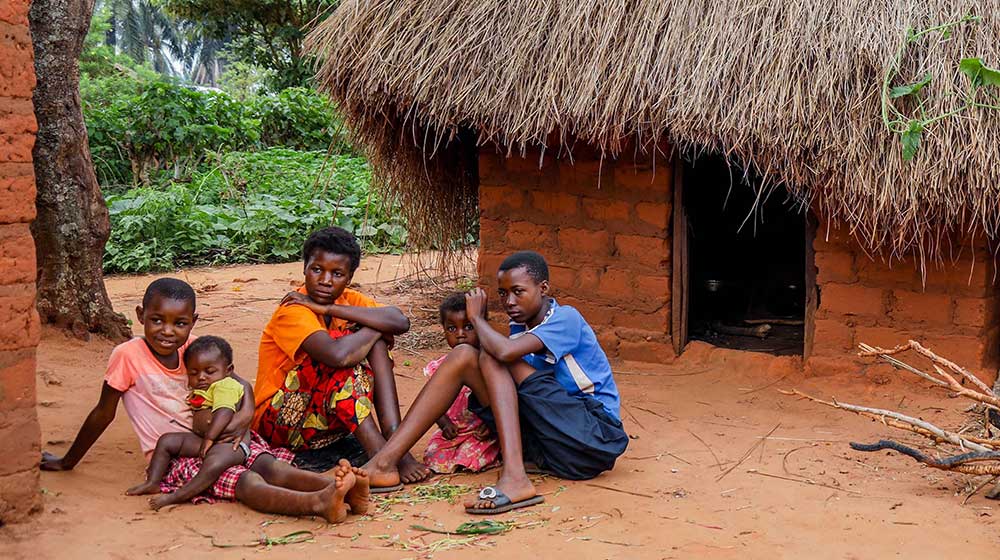News
Diamonds are scarce – sexual and reproductive health information shouldn’t be
- 14 December 2021
News
LUAMBO, Democratic Republic of the Congo – At only 35, Nsenga Malu has lived many lives. In one, she was a girl growing up in the city of Luambo, in her home country of the Democratic Republic of the Congo. Then, her childhood halted abruptly when she married at the age of 15 and immediately began childbearing. Within 13 years, she’d had eight children, with an average of 11 months between pregnancies.
The pregnancies increasingly took a toll on her health and ability to work. "When I am pregnant, I am sick, I can't work and I have difficulties feeding my family," she explained to UNFPA.
After her eighth child was born, Ms. Malu and her husband made the decision to start over in Angola. There, where her husband could mine for what they called that "rare stone" – diamonds. Resources were stretched thin with so many mouths to feed, and the dream of building a life as diamond hunters didn’t seem any more distant, perhaps even less so, than the prospect of providing for their children at home.
Still, life was hard. The family arrived in Angola without the proper documents – which is against the law. Those of her children who had gone to school in Luambo were no longer eligible to enrol. While her husband mined for diamonds on his own, also without proper permission, Ms. Malu ran a small business to support the family.
But diamonds were not the only elusive commodity – so was contraception, as much in her new country as in her home one.
About three years into their stay in Angola, Ms. Malu learned she was pregnant again. Shortly afterward, their family was arrested for entering the country illegally, and they were deported back to the Democratic Republic of the Congo.
I did not know it was possible to organize the birth of children. I never received this type of information.”
Deportation has grown increasingly common for Congolese people who migrate to Angola. In the first eight months of 2021, more than 800 people were reportedly deported from Angola at the Kalamba Mbuji border post alone. Many others, like Ms. Malu’s family, were deported from Kamako in Angola, to the Congolese Kasai Province. As of last September, border authorities had concluded that 3,000 people at this entry port were not eligible for refugee status and had to return to the Democratic Republic of the Congo.
Ms. Malu’s family had to restart their lives, once again. They resettled in Luambo, largely without material or financial resources. Relatives were able to give them a house, a modest two-room building.
Soon after, at the Luambo Health Centre, Ms. Malu gave birth to her ninth child.
There, she and the baby were cared for by the head nurse, Irene Kunda, who paid particular attention to Ms. Malu – asking not only about her health but also her goals and desires.
Upon learning that Ms. Malu had been pregnant so many times, and at such frequent intervals, since age 15, Ms. Kunda asked why she had not practised birth spacing. Ms. Malu replied, “I did not know it was possible to organize the birth of children. I never received this type of information.”

Sexual and reproductive health information is too often scarce for young people growing up in the Democratic Republic of the Congo. Comprehensive sexuality education is typically not available in schools, for example.
With little information about their bodies, reproductive health or contraceptive options, many women in the country experience high levels of fertility. The national fertility average is 5.6 children per woman, with rates in Kasai even higher.
Finally, after the birth of her ninth child, Ms. Malu was informed about family planning. She was eager to start.
Today, her family of 13 – including herself, her husband, nine children and two grandchildren – live together in their two-room home. To get by, Ms. Malu is a subsistence farmer and sells firewood she collects from the bush.
UNFPA supports health services in Kasai Central, Kasai, Sankuru and Kasai Oriental, all provinces in the Democratic Republic of the Congo that have recently faced serious hardships, including conflict, poverty, poor access to health facilities and widespread hunger.
With financial support from the Humanitarian Fund, UNFPA is working with partners, such as Caritas Kananga, to provide primary health and family planning care, services to prevent and respond to gender-based violence, as well as supplies such as dignity kits, which contain hygiene and menstrual products.
These services are life-saving – even, or especially, family planning. While the health care and dignity kits have been helpful, Ms. Malu says it is the family planning support that keeps her going.
"Contraception allows me to avoid getting sick,” she said. “If I get pregnant again, the children will not have enough to eat.”